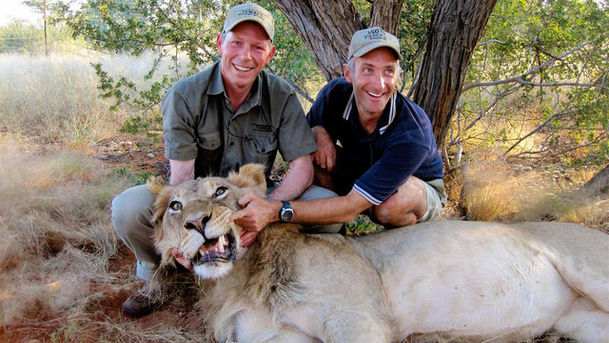Big Game, Little Game - Episode 2

Mark Stephen charts a unique swap involving two gamekeepers - one from the Kalahari, the other from the Angus Glens. Gamekeeper Andy Malcolm is swapping 40,000 acres of heather moorland high in the Angus Glens for a reserve on the edge of the Kalahari in South Africa. The game warden from there will travel to Scotland in a unique swap documented for BBC Radio 4. The programmes offer the very different perspectives of Scottish gamekeeper Andy Malcolm and his South African counterpart Dylan Smith. Both men track their experiences in the form of audio diaries and in reflections to presenter Mark Stephen who is alongside them in this job exchange. How they deal with issues ranging from land conservation to animal welfare and how far experiences in their own landscapes can translate into ideas for their new ones, is at the heart of the recordings. The Tswalu game reserve in South Africa is currently owned by Nicky Oppenheimer's family but was originally the vision of the Manchester entrepreneur Stephen Boler. In a four year period he established the 100 000 hectare reserve and introduced thousands of game animals, including sable and roan antelope, Cape buffalo and cheetah. Following his death in 1999 the Oppenheimers purchased Tswalu and set about the task of restoring the Kalahari to itself: hunting was stopped, farm buildings and fences were removed and indigenous game like the endangered desert black rhino and black-maned Kalahari lions were brought home. The Oppenheimer's regularly spent time at Lord Dalhousie's Invermark estate in Scotland and although the lands were vastly different the realities of overseeing them was not: the idea of an exchange arose from a desire to broaden the experiences of the two management teams. Dylan Smith, Tswalu's Projects Manager, is engaged in a huge conservation effort which allows many endangered animals to flourish. In some cases, surpluses are used to restock other reserves. In Scotland there is a harsher reality; Invermark is a traditionally run sporting estate and it's continued survival is dependant on producing Red Grouse and Red Deer for shooting. Andy Malcolm and the other five gamekeepers who work this 55,000 acre highland wilderness take 700 deer and up to 1200 brace of grouse annually. However they are quick to point out that there are many other beneficiaries. "It's a well documented fact that managing moorland for grouse improves habitat and increases biodiversity. And at peak times the estate employs up to 40 seasonal workers- grousebeaters, ghillies, ponymen and the like. That, in turn, boosts the local economy. All of this is not always appreciated politically. Andy Malcolm's life in Kalahari takes some adjusting to: from the tortoise ambling across the road, to adrenalin filled ventures when he's tracking rhinos and zapping lions: "It's the end of a most amazing week...I'm aware of how much I haven't told you. I haven't told you just how amazing this place really is; how extraordinary it is to be seeing so many different animals, birds, insects and plants; and how perplexing it is not to know what they are; how strange it feels to be in an environment that holds potential dangers. It's a place that, if it weren't for the roads, you could imagine nobody had ever been here before you. When I get up in the morning, the first thing I do is open the doors and listen. Back home, you can always hear a river or burn, or the wind in the trees, or a dog barking, or a plane flying over. Here it's a stillness that's more like total deafness. And as I have breakfast, I listen to the world waking up. "And I still haven't scratched the surface of Tswalu..It has a vast area of plain crossed with dunes, parallel but half a mile between them, it has mountains that look higher than anything we've got and far more inaccessible due to the incredibly broken ground, it has hidden glens and I've even seen a pond! It has big open areas and dense thicket, it has trees that look so old and gnarled that they might have seen the very first white men. And it's hot." Meanwhile in Scotland Dylan is also adjusting - particularly given the dramatic change in temperature and the very different tasks undertaken, from cutting firewood for the bothies to shovelling gravel into potholes: "this has been one of the most unusual weeks I have spent in my entire life. Invermark is an incredible place - I have often heard of the Scottish Highlands and yet when one hears such talk, one is never truly able to capture the essence of a place. In order for this to happen, for a place to be indelibly imprinted on ones mind and soul, one needs to be drawn into its very heart and soul." Producer: Sue Mitchell.